Politics
Suspected gunman Tyler Robinson wrote note threatening Kirk, says FBI director
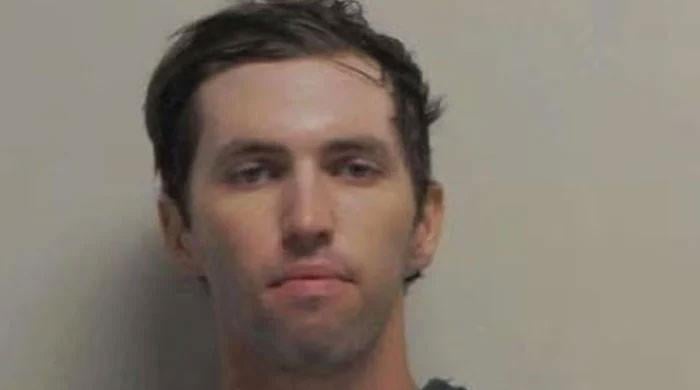
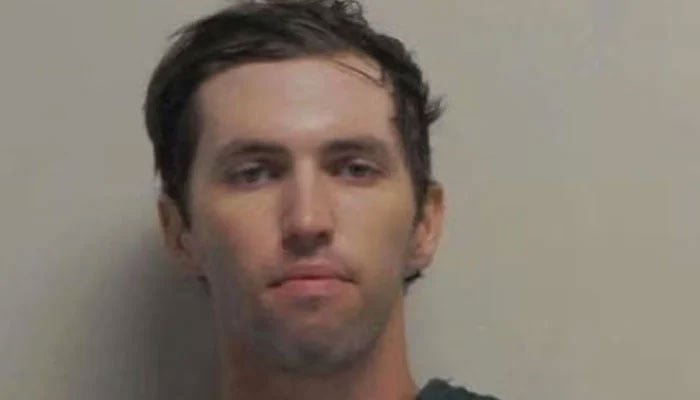
- Robinson’s DNA at the scene, says FBI director Patel.
- Robinson’s initial court appearance set for Tuesday.
- Investigators have not publicly identified a motive.
The suspect of assassinating right-wing activist Charlie Kirk in Utah wrote a text message before the shooting that he planned to kill Kirk, FBI Director Kash Patel said on Monday.
In an appearance on Fox News‘ “Fox & Friends,” Patel said investigators believe Tyler Robinson also wrote a physical note saying he had the “opportunity to take out Charlie Kirk” and would do so. The note was destroyed, Patel said, but investigators have collected forensic evidence that it had existed and confirmed its contents through interviews.
Patel did not say who had received the text message or whether anyone had seen the written note before the attack.
Investigators have not publicly identified a motive. Law enforcement authorities have said they believe Robinson acted alone when he shot Kirk but are investigating whether anyone else had a role in plotting the killing.
Separately, the Washington Post reported on Monday that Robinson had sent a message via the online platform Discord to friends apparently confessing to the crime on Thursday night, shortly before he was arrested.
“It was me at UVU yesterday. I’m sorry for all of this,” read a message from the account belonging to Robinson, the newspaper reported, citing two people familiar with the chat as well as screenshots it had obtained.
Kirk, an influential ally of US President Donald Trump who co-founded the leading conservative student group Turning Point USA, was killed by a single rifle shot last Wednesday during an event at Utah Valley University in Orem, about 40 miles south (65 km) of Salt Lake City.
Court hearing by video
Robinson, 22, is expected to be formally charged on Tuesday, around the same time that he makes an initial court appearance by video from his jail cell.
Patel told Fox News that DNA matching the suspect’s was found on a towel that was wrapped around the rifle believed to be the murder weapon and on a screwdriver found on the rooftop that served as the shooter’s sniper perch.
Robinson has not cooperated with authorities, Utah Governor Spencer Cox said on Sunday, but investigators have been interviewing his friends and family in an effort to determine the motive for the shooting.
The killing has shaken a country already gripped by a spike in political violence, fueled by deepening polarisation between the right and the left.
Both sides have universally condemned Kirk’s slaying as an indefensible act of political violence, though partisan differences have emerged over the framing of that message.
Some Republicans, including Trump, have blamed liberal groups for Kirk’s murder despite a lack of evidence, while Democrats have noted that left-wing figures have also been the targets of political violence in recent years.
The left and right also disagree over Kirk’s legacy and how he should be remembered.
Legacy divided
Kirk’s supporters cast him as an influential and charismatic figure who galvanised support for Trump among younger voters in 2024, and the Republican president has honored Kirk by ordering flags flown at half staff on public buildings.
Civil rights advocates and liberals have criticised Kirk as a divisive figure who embraced Trump’s unsubstantiated claims of a stolen election in 2020 and has marginalised Blacks, women, the LGBT community, Muslims and immigrants with derogatory rhetoric.
In an appearance on Kirk’s eponymous podcast on Monday, Vice President JD Vance said the “incredibly destructive movement of left-wing extremism” had helped lead to Kirk’s killing.
While Robinson was raised in a Mormon household by religious parents in a deeply conservative region of the state, “his ideology was very different than his family,” Cox said on Sunday on NBC’s “Meet the Press” program, without going into specifics.
State records show Robinson had registered to vote without choosing a party affiliation and did not vote in the 2024 presidential election. But a relative told police that Robinson had grown more political and had expressed dislike for Kirk in a recent conversation.
House Speaker Mike Johnson and three other top members of the House Republican leadership held a brief vigil on Monday for Kirk, attended by dozens of lawmakers, friends and supporters in Statuary Hall of the US Capitol.
Back in Utah, at the scene of Kirk’s assassination, scores of mourners have flocked to makeshift memorials in recent days to leave flowers and handwritten notes, and to inscribe messages in chalk on campus sidewalks, many of them Bible verses.
Dally Bronson, 22, a sheriff’s dispatcher from neighboring Wasatch County who was on duty at the time Kirk was shot, said that as a devout Christian she felt torn about what justice should look like.
Describing herself as an admirer of Kirk, Bronson said she had been praying for both him and his accused killer.
“By all accounts (Robinson) was a good kid until recently, when something went terribly wrong,” she said, speaking through tears. Kirk’s “killing isn’t about one political side or the other — it’s about good and evil. The shooter encountered a darkness online, he went into some black hole on the internet, and it’s something people our age fall into.”
Politics
Trump invites more leaders to join Gaza ‘Board of Peace’
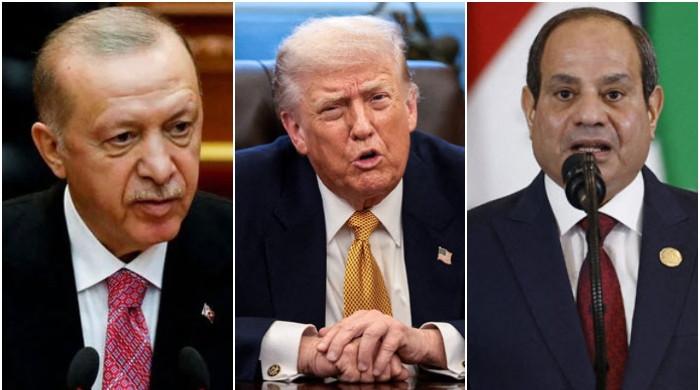
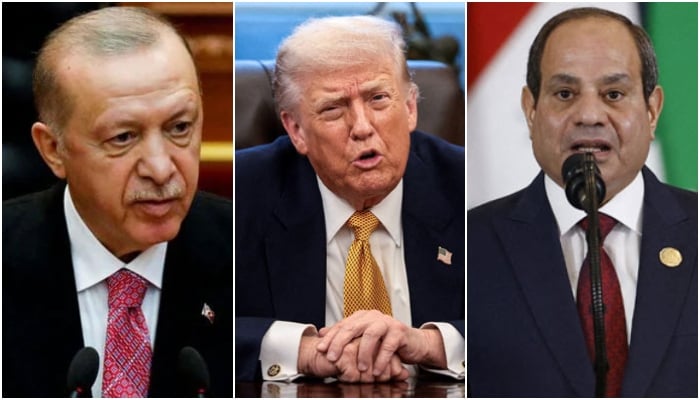
- Cairo “studying” request for Sisi to join board, says FM.
- Canadian PM intends to accept Trump’s invitation: aide.
- Argentine president says it will be an ‘honour’ to join initiative.
WASHINGTON: US President Donald Trump’s so-called “Board of Peace” for postwar Gaza began to take shape Saturday, with the leaders of Egypt, Turkey, Argentina and Canada asked to join.
The announcements from those leaders came after the US president named his Secretary of State Marco Rubio, former British prime minister Tony Blair, and senior negotiators Jared Kushner and Steve Witkoff to the panel.
Trump had already declared himself the chair of the body, as he promotes a controversial vision of economic development in the Palestinian territory, which lies in rubble after two-plus years of relentless Israeli bombardment.
The moves came after a Palestinian committee of technocrats meant to govern Gaza held its first meeting in Cairo which was attended by Kushner, Trump’s son-in-law who has partnered with Witkoff for months on the issue.
In Canada, a senior aide to Prime Minister Mark Carney said he intended to accept Trump’s invitation, while in Turkey, a spokesman for President Recep Tayyip Erdogan said he had been asked to become a “founding member” of the board.
Egypt’s Foreign Minister Badr Abdelatty said Cairo was “studying” a request for President Abdel Fattah al-Sisi to join.
Sharing an image of the invitation letter, Argentine President Javier Milei wrote on X that it would be “an honour” to participate in the initiative.
In a statement sent to AFP, Blair said: “I thank President Trump for his leadership in establishing the Board of Peace and am honoured to be appointed to its Executive Board.”
Blair is a controversial figure in the Middle East because of his role in the 2003 invasion of Iraq. Trump himself said last year that he wanted to make sure Blair was an “acceptable choice to everybody.”
Blair spent years focused on the Israeli-Palestinian issue as representative of the “Middle East Quartet” – the United Nations, European Union, United States and Russia – after leaving Downing Street in 2007.
The White House said the Board of Peace will take on issues such as “governance capacity-building, regional relations, reconstruction, investment attraction, large-scale funding and capital mobilisation.”
The other members of the board so far are World Bank President Ajay Banga, an Indian-born American businessman; billionaire US financier Marc Rowan; and Robert Gabriel, a loyal Trump aide who serves on the US National Security Council.
Trump has created a second “Gaza executive board” that appears designed to have a more advisory role.
It was not immediately clear which world leaders were asked to be on each board.
The White House, which said Friday that additional members would be named to both entities, did not immediately reply to a request for comment.
Israel strikes
Washington has said the Gaza plan had gone on to a second phase – from implementing the ceasefire to disarming Hamas, whose October 2023 attack on Israel prompted the massive Israeli offensive.
On Friday, Trump named US Major General Jasper Jeffers to head the International Stabilization Force, which will be tasked with providing security in Gaza and training a new police force to succeed Hamas.
Jeffers, from special operations in US Central Command, in late 2024 was put in charge of monitoring a ceasefire between Lebanon and Israel, which has continued periodic strikes aimed at Hezbollah.
Gaza native and former Palestinian Authority deputy minister Ali Shaath was earlier tapped to head the governing committee.
Trump, a real estate developer, has previously mused about turning devastated Gaza into a Riviera-style area of resorts, although he has backed away from calls to forcibly displace the population.
Politics
India slaps $2.45m fine on IndiGo for mass flight cancellations
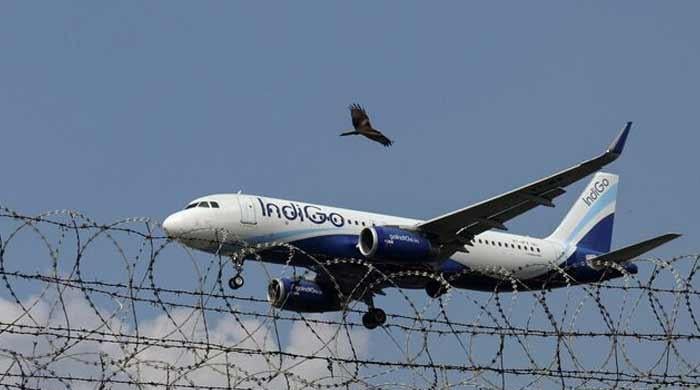
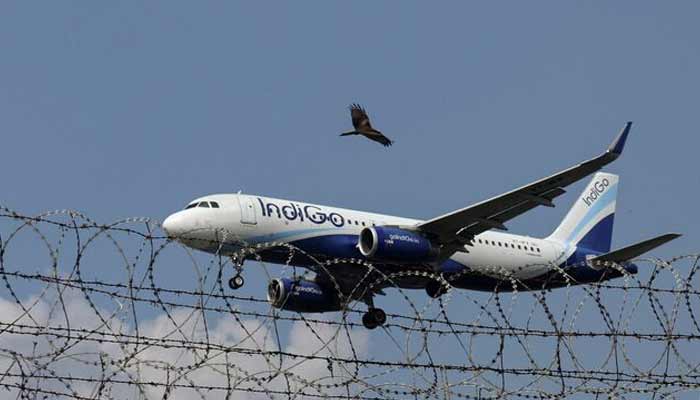
- Private carrier admits misjudgement, planning gaps.
- Regulator orders IndiGo to relieve senior office bearers.
- Operational meltdown linked to new policy of pilot rest.
India’s civil aviation regulator on Saturday imposed a fine of $2.45 million on IndiGo, the country’s biggest airline, for poor roster planning that led to large-scale flight cancellations in December.
Airports across India were thrown into disarray late last year, with the private carrier admitting “misjudgement and planning gaps” in adapting to a new policy of pilot rest.
Over 4,000 mostly domestic flights were either cancelled or delayed for over a week across the country, stranding hundreds of thousands of passengers.
The operational meltdown came even though IndiGo had two years to prepare for the new rules aimed at giving pilots more rest periods in between flights to enhance passenger safety.
The Directorate General of Civil Aviation (DGCA) said it was levying the penalty for several lapses, including “failure to strike (a) balance between commercial imperatives and crew members’ ability to work effectively”.
The regulator ordered IndiGo to relieve its senior vice president of its operations control centre of his responsibilities, according to a statement released on Saturday.
It also issued warnings to senior officials at the company, including CEO Pieter Elbers “for inadequate overall oversight of flight operations and crisis management”.
There was no immediate response from IndiGo to the fine.
IndiGo, which commands 60% of India’s domestic market, operates more than 2,000 flights a day.
The crisis was one of the biggest challenges faced by the no-frills airline that has built its reputation on punctuality.
India is one of the world’s fastest growing aviation markets. In November 2024, IndiGo reached a daily level of 500,000 passengers for the first time.
Politics
Protesters rally in Denmark and Greenland against Trump annexation threat
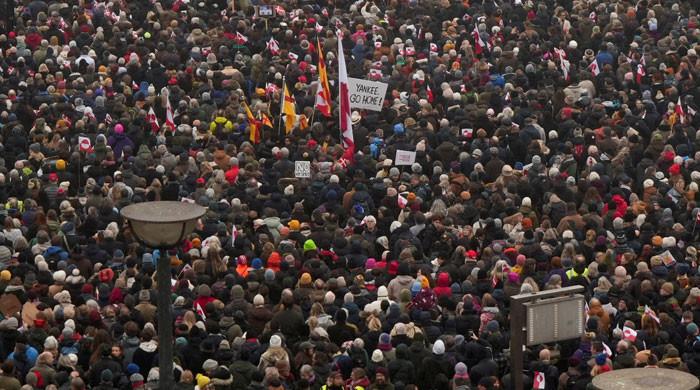
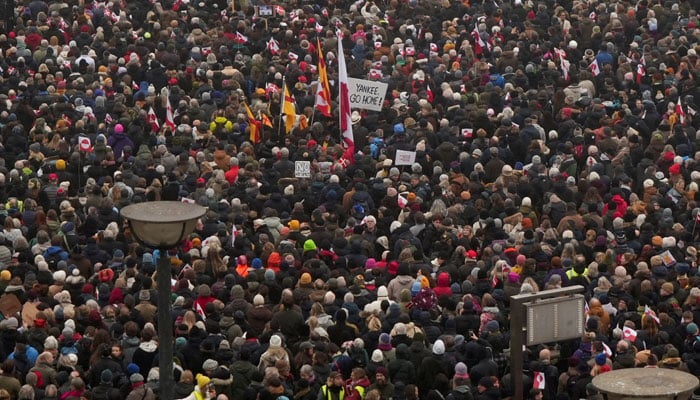
- Protesters chant, “Greenland is not for sale.”
- Over “20,000 people” attend protest in Copenhagen.
- Trump says Greenland vital to US security.
COPENHAGEN: Protesters in Denmark and Greenland demonstrated on Saturday against President Donald Trump’s demand that the Arctic island be ceded to the US and called for it to be left to determine its own future.
Trump says Greenland is vital to US security because of its strategic location and large mineraldeposits, and has not ruled out using force to take it. European nations this week sent military personnel to the island at Denmark’s request.
In Copenhagen, demonstrators chanted “Greenland is not for sale” and held up slogans such as “No means No” and “Hands off Greenland” alongside the territory’s red-and-white flag as they marched to the US embassy.
Some wore red baseball caps resembling the “Make America Great Again” caps of Trump supporters, but with the slogan “Make America Go Away”.
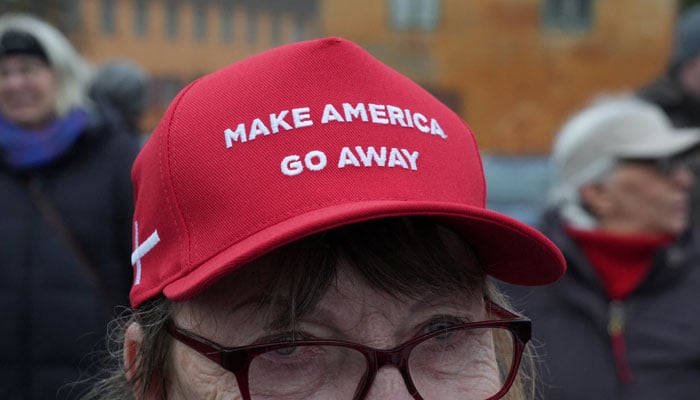
In Greenland’s capital Nuuk, hundreds of protesters led by Prime Minister Jens-Frederik Nielsen carried flags and similar banners as they headed for the US consulate.
They passed a newly built block where Washington plans to move its consulate – currently a red wooden building with four staff.
Organisers estimated over 20,000 people attended the protest in Copenhagen – akin to the entire population of Nuuk – though police did not provide an official figure. Other protests were held across Denmark.
“I am very grateful for the huge support we as Greenlanders receive … we are also sending a message to the world that you all must wake up,” said Julie Rademacher, chair of Uagut, an organisation for Greenlanders in Denmark.
Trump triggers diplomatic rift
Trump’s repeated statements about the island have triggered a diplomatic crisis between the US and Denmark, both founding members of the NATO military alliance, and have been widely condemned in Europe.
The territory of 57,000 people, governed for centuries from Copenhagen, has carved out significant autonomy since 1979 but remains part of Denmark, which controls defence and foreign policy, and funds much of the administration.
Some 17,000 Greenlanders live in Denmark, according to Danish authorities.
All five parties elected to Greenland’s parliament ultimately favour independence, but they disagree on the timing and have recently said they would rather remain part of Denmark than join the US
Only 17% of Americans approve of Trump’s efforts to acquire Greenland, and large majorities of Democrats and Republicans oppose using military force to annex it, a Reuters/Ipsos poll found. Trump called the poll “fake”.
-

 Tech5 days ago
Tech5 days agoNew Proposed Legislation Would Let Self-Driving Cars Operate in New York State
-

 Sports7 days ago
Sports7 days agoClock is ticking for Frank at Spurs, with dwindling evidence he deserves extra time
-
Sports1 week ago
Commanders go young, promote David Blough to be offensive coordinator
-

 Entertainment4 days ago
Entertainment4 days agoX (formerly Twitter) recovers after brief global outage affects thousands
-

 Fashion7 days ago
Fashion7 days agoSouth India cotton yarn gains but market unease over US tariff fears
-

 Fashion7 days ago
Fashion7 days agoChina’s central bank conducts $157-bn outright reverse repo operation
-

 Business1 week ago
Business1 week agoSoftBank reduces Ola Electric stake to 13.5% from 15.6% – The Times of India
-

 Sports7 days ago
Sports7 days agoUS figure skating power couple makes history with record breaking seventh national championship






